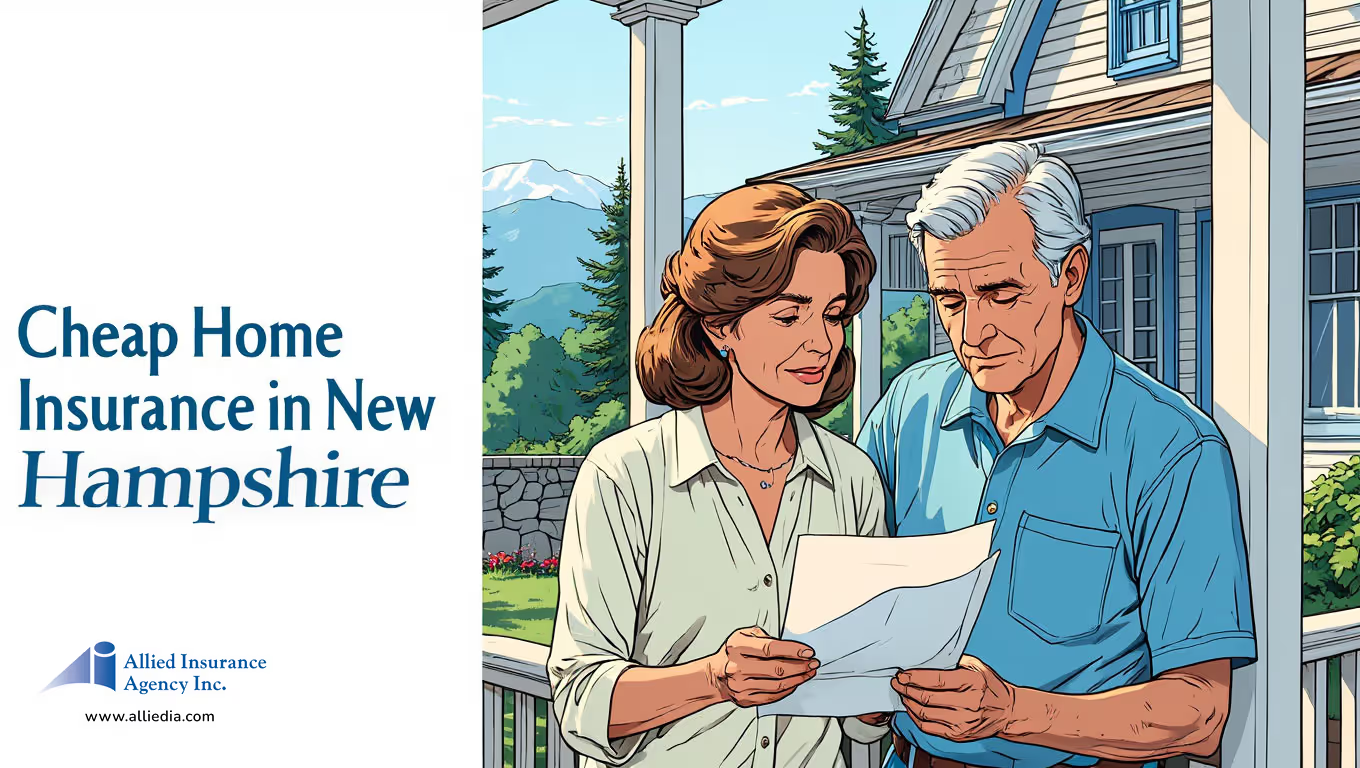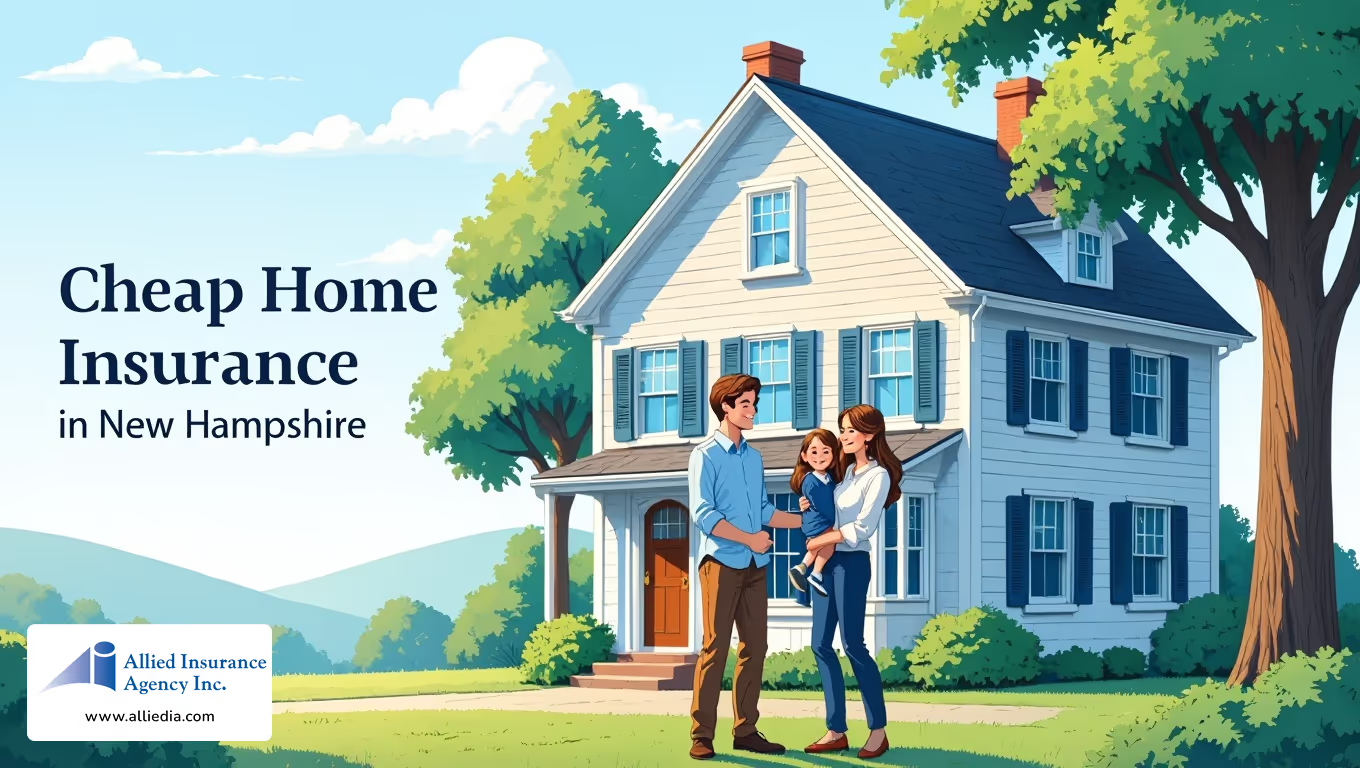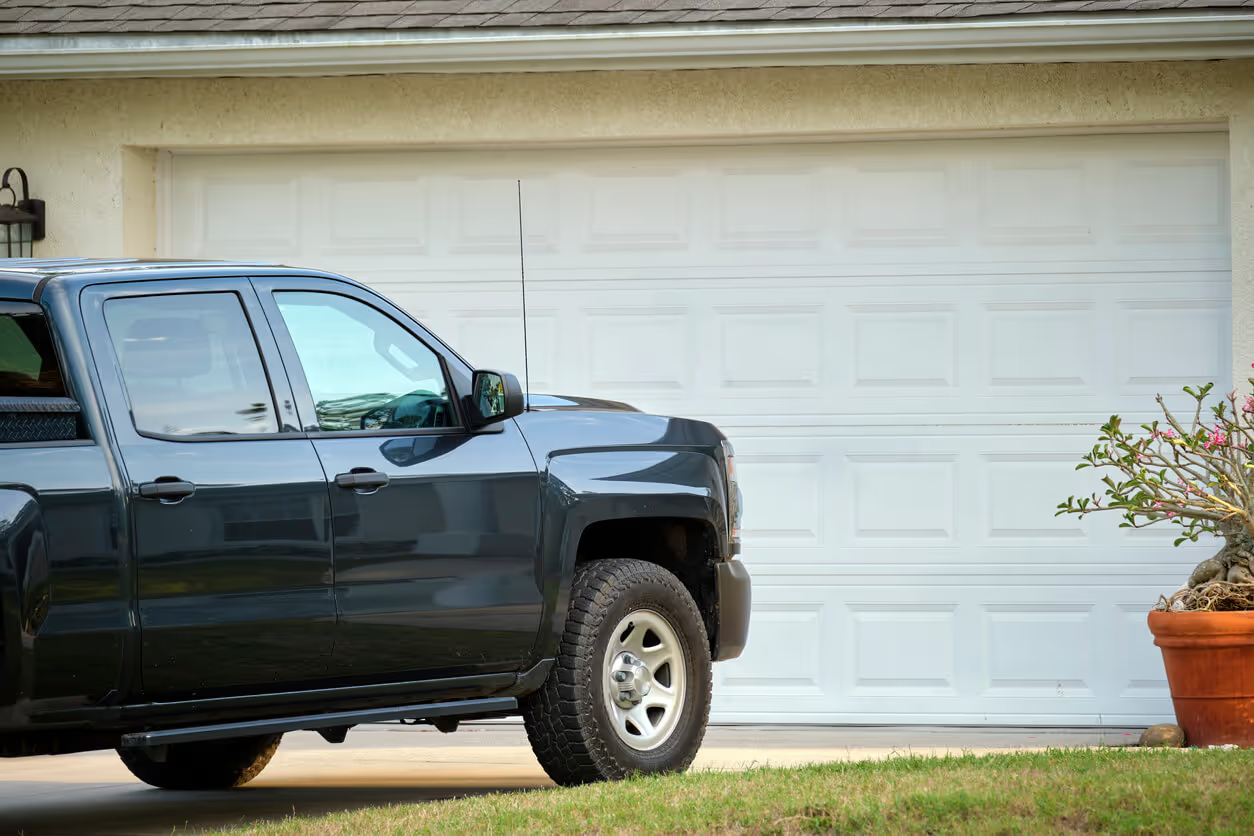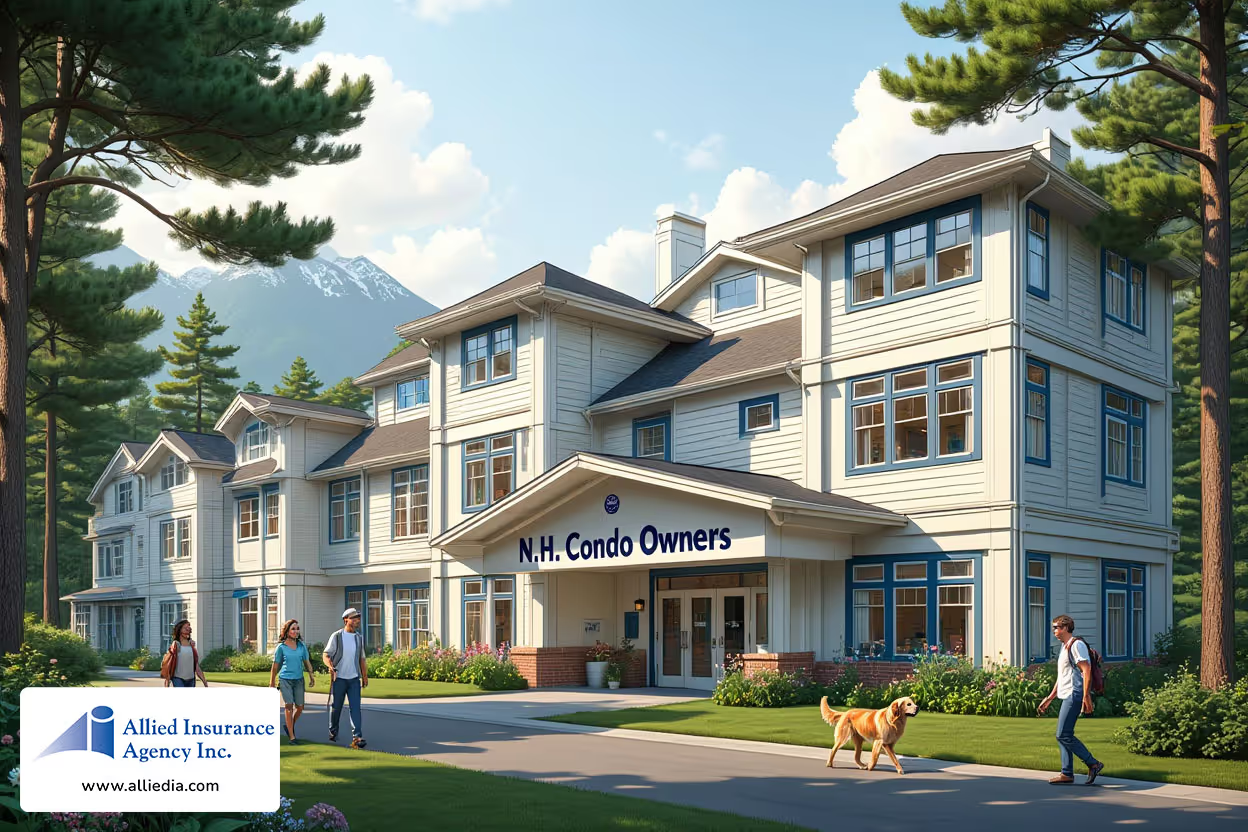
How to Get Cheap Home Insurance in New Hampshire Without Sacrificing Coverage
Did you know New Hampshire residents pay nearly half the national average for property coverage? Annual premiums here range from $953 to $1,185, compared to the U.S. average of $1,754-$2,110. This 44-46% cost difference creates opportunities for homeowners to secure robust policies while staying budget-conscious. Contact Allied Insurance Agency for a N.H. home insurance quote.
The state’s unique market conditions allow property owners to balance affordability with quality safeguards. Lower risk factors like weather patterns and crime rates contribute to these favorable rates. However, finding the right policy requires understanding regional considerations and coverage nuances.
Many Granite State residents work with local agencies to navigate options effectively. Reputable providers like Allied Insurance Agency specialize in matching homeowners with tailored solutions. Their free consultations help identify discounts and essential protections specific to New England properties.
This guide reveals strategies for maintaining comprehensive safeguards while optimizing costs. Readers will learn how to avoid common pitfalls and leverage New Hampshire’s competitive insurance landscape. From evaluating deductibles to understanding liability limits, every aspect gets explored through a local lens.
Overview of the Home Insurance Landscape in New Hampshire
New Hampshire's property coverage market features intense competition among over 30 providers. This rivalry creates opportunities for comprehensive policies at competitive rates. Geographic factors like coastal exposure and river systems necessitate specific protections, particularly against flooding.
Local Market Insights
The state's regulatory environment ensures consumer protections through the Insurance Department, which handles disputes and maintains industry standards. Carriers frequently adjust offerings to address regional risks, from winter storms to water damage. Local agents prove invaluable for navigating these specialized options and identifying cost-saving opportunities.
Understanding Policy Coverage Essentials
Standard protections typically include four core components:
- Structural repairs for dwellings
- Replacement of personal belongings
- Liability safeguards
- Temporary housing costs
Flood damage requires separate policies in most cases, as standard plans exclude this risk. Annual policy reviews help maintain adequate safeguards as property values and risks evolve.
Cheap home insurance new hampshire: What Homeowners Need to Know
Securing the right protection for your property involves more than just finding the lowest premium. Analysis reveals significant price differences among providers – some charge over $1,500 annually, while others like American Family and Vermont Mutual offer plans under $600. The challenge lies in identifying policies that deliver quality safeguards without unnecessary expenses.
Balancing Affordability and Comprehensive Coverage
Smart shoppers prioritize insurers with strong financial ratings and fast claim resolution. Local providers often understand regional risks better, from ice dams to nor'easters. Consider carriers that offer:
- Accurate dwelling coverage matching rebuild costs
- Replacement value for personal items
- Liability limits above state minimums
Key Features to Consider
The best homeowners insurance policies address specific New England weather patterns. Look for add-ons like sump pump failure coverage or extended replacement cost. Reputable homeowners insurance companies typically provide:
- 24/7 claims support
- Multi-policy discounts
- Flexible deductible options
Review customer satisfaction scores through resources like J.D. Power rankings. Plymouth Rock and Vermont Mutual consistently rank high for responsiveness in the Northeast. Remember – the cheapest home insurance might lack critical protections, while mid-priced plans often deliver superior value.

Factors Affecting Home Insurance Costs and Savings Opportunities
Creditworthiness and financial responsibility significantly influence protection costs across the Granite State. Insurers analyze credit-based scores to predict risk, creating substantial price differences between policyholders. Those maintaining scores above 700 typically pay 74% less than individuals with poor credit histories.
Financial History's Role in Premium Calculations
Recent claims activity remains a critical consideration for carriers. Multiple claims within three years can increase annual costs by 111% compared to claim-free properties. Some providers even decline coverage for frequent claimants, emphasizing the value of preventive maintenance and risk reduction.
Strategic Deductible Selection and Valuation Accuracy
Choosing higher deductibles lowers recurring expenses but requires accessible emergency funds. Common options range from $500 to $2,500, with each $1,000 increase typically saving 10-15% annually. Accurate property valuations prevent overpaying while ensuring sufficient rebuild coverage, particularly given local construction material costs.
Three regional considerations impact pricing:
- Proximity to flood zones or wildfire-prone areas
- Municipal fire protection ratings
- Crime statistics within ZIP codes
Regular policy reviews help maintain optimal coverage as these factors evolve. Many residents work with licensed professionals to balance immediate savings with long-term financial security.
Comparing Home Insurance Options in Concord, Bow, and Hooksett
Geographic location plays a pivotal role in determining protection costs across New Hampshire's capital region. Concord, Bow, and Hooksett demonstrate how neighborhood characteristics influence policy pricing and coverage requirements.
Local Risk Factors and Regional Variations
Concord's urban environment creates unique considerations for property owners. Higher population density near government facilities often leads to increased liability assessments. Areas adjacent to the Merrimack River frequently require supplemental flood policies due to federal floodplain designations.
Bow's suburban layout typically results in lower risk profiles. Reduced crime statistics and newer infrastructure help maintain competitive rates. However, properties bordering wooded areas may need enhanced wildfire protections.
Hooksett's position along Route 3 introduces distinct challenges. Commercial-residential zoning mixes and transportation corridor exposure impact insurer evaluations. Local construction standards addressing seasonal weather patterns also affect coverage terms. Contact Allied Insurance Agency for a N.H. home insurance quote.
Neighborhood Rate Differences Explained
Annual premiums reveal significant variations:
- Concord: $952 average (urban services offset some risks)
- Bow: 5% below state average (favored risk profile)
- Hooksett: Mixed rates (depends on flood zone proximity)
Fire department response times create price differences within ZIP codes. Properties within 5 miles of stations often qualify for discounts. Historical claim data also influences costs – neighborhoods with frequent weather-related claims face higher premiums.
Smart shoppers compare multiple quotes while considering location-specific protections. Working with agents familiar with Merrimack Valley's nuances helps identify appropriate safeguards and potential savings.

Exploring Coverage Options and Policy Types
Understanding policy components helps property owners make informed decisions about their safeguards. Most plans follow the HO-3 format, offering broad protections while excluding specific risks like earthquakes or floods. These agreements balance affordability with essential safeguards through six core elements.
Standard Coverage Components: Dwelling, Liability, and Personal Property
Dwelling coverage forms the backbone of every policy, protecting main structures and attached features like cabinetry or plumbing systems. Policies typically cover repair costs for damage caused by fire, wind, or vandalism. Exact limits should match rebuild estimates rather than market values.
Three critical protections extend beyond the physical building:
- Personal property: Replaces belongings at current prices if using replacement cost coverage
- Liability safeguards: Covers legal fees and medical bills if someone gets injured on your property
- Other structures: Protects detached buildings like sheds or fences
Additional living expense coverage proves vital during major repairs, covering hotel stays and meals. Medical payment provisions handle smaller injury claims regardless of fault. Regular policy reviews ensure these elements keep pace with lifestyle changes or property upgrades.
Smart shoppers compare how insurers handle claims and calculate replacement costs. Some carriers automatically adjust dwelling limits based on construction cost trends, while others require manual updates. Always verify whether policies use actual cash value or full replacement calculations for belongings. Contact Allied Insurance Agency for a N.H. home insurance quote.
Evaluating Top Homeowners Insurance Providers
Selecting the right property protection requires careful evaluation of provider capabilities and service quality. Savvy homeowners prioritize insurers offering balanced value through financial strength, responsive support, and adaptable coverage options.
Core Evaluation Criteria for Reliability
Reputable homeowners insurance companies maintain high marks across three critical areas:
- A.M. Best ratings of A- or higher for fiscal stability
- Low complaint ratios tracked by state regulators
- Consistent customer satisfaction in claims handling
Providers with dividend policies or extended replacement cost endorsements often deliver superior long-term value. These features help policies keep pace with rising construction costs.
Discount Structures and Service Benchmarks
Leading insurers distinguish themselves through multi-tier discount programs. These reward property owners for installing security systems, maintaining claim-free histories, and bundling multiple policies. Robust digital platforms and 24/7 claims support further demonstrate customer-focused operations.
Industry Recognition and Performance Trends
Third-party analyses reveal top performers in annual rankings. The best home insurance providers excel in:
- Average claim resolution time (under 48 hours)
- Policy customization flexibility
- Transparent communication during renewals
Regional expertise proves vital when addressing weather-related risks. Companies with localized adjuster networks typically resolve claims faster after severe storms or freeze events.

Tips to Secure a Free Quote from Allied Insurance Agency
Securing a tailored policy starts with gathering accurate property details and understanding coverage needs. Allied Insurance Agency simplifies this process through personalized consultations with agents familiar with regional risks.
Step-by-Step Process for Requesting a Quote
Begin by preparing property specifics: construction materials, safety upgrades, and square footage. Contact the agency via phone or online form to schedule a no-cost evaluation.
During the consultation, discuss current coverage gaps and desired protections. Agents analyze rebuild costs, liability needs, and weather-related risks specific to your area. This ensures accurate comparisons across multiple carriers.
Questions to Ask Your Insurance Agent
Inquire about bundling opportunities for auto or umbrella policies. Ask how claims get processed during severe weather events common in the region.
Confirm whether policies include replacement cost calculations for belongings. Discuss deductible options that align with your emergency fund capacity. Key considerations should address coverage limits for water damage and ice dams.
Allied’s local N.H. insurance agents helps homeowners compare policies from various providers in one session. Their expertise identifies often-overlooked discounts while explaining exclusions clearly. This approach balances comprehensive safeguards with budget-friendly solutions.
Contact Allied Insurance Agency for a N.H. home insurance quote.



